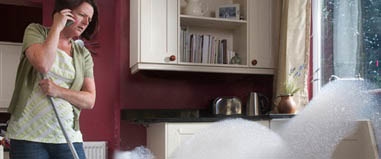
After a disaster occurs, dealing with the aftermath can be overwhelming. If your home is damaged due to fire, water or mold, taking the necessary steps to protect your property and belongings is crucial to prevent further damage from occurring. While you may be tempted to go into damage control mode and take matters into your own hands, doing so could only lead to more problems.
The experts at ServiceMaster Restore® want to make sure you know what to do if disaster strikes. Learn what steps you should take immediately to ensure the best outcome for restoring your home and who you should call first after a disaster.
1. Put safety first
If your home is no longer safe, your first priority should be to get yourself and other occupants to safety. Disasters like a fire or flood can threaten the structure of your home, so don't wait around for assistance.
The way you should respond whenever disaster strikes will vary based on the source of the damage. For example, if your home is flooding, water may come into contact with electric currents, putting you at risk of electric shock. If possible, turn off your water supply and electricity. If your breaker box isn't located in a safe area, leave your house and contact your local power company immediately. Most importantly, if you're unsure about whether the electricity is still on, don't enter your house. Learn more about what to do after a flood so you can be prepared if the unthinkable happens.
In the case of a fire, your first thoughts may be to salvage important documents or possessions. Don't put your life at risk. Instead, immediately vacate your home and call the fire department. Make sure all occupants are accounted for. Find out more information about what to do after a fire.
2. Contact your insurance company first
If you have a home insurance policy, once everyone in your house is safe, contact your insurance agent to file a claim. Even if it's safe to re-enter your home to collect possessions, assess damage or clean, this could lead to problems with your insurance claim. For example, if you attempt to vacuum up pooling water, you could destroy essential evidence your home insurance company requires to file your claim.
Before cleaning or salvaging belongings, work with your insurance agent first to determine the right course of action for filing a claim so you can get the help you need for covering damages. Your insurance agent may ask you:
- What was the source of the damage?
- Where is most of the damage located?
- Has the damage left your house exposed to the elements? Report any broken windows, holes in the roof and other damage.
3. Contact a restoration company
Your home insurance company can either recommend a list of restoration companies to you, or you can select your own. At that point, the insurance company and the restoration company can work together to get your home back to normal. They'll communicate with each other about the restoration process and explain each step to you, so everyone remains on the same page.
How to choose the right restoration company
While there are multiple restoration companies to choose from, finding a trusted, experienced company can help to reduce the stress associated with the disaster. When picking a restoration company, opt for one that offers the following:
- 24/7 support so you can quickly get the help you need.
- Fast response times to mitigate as much damage as possible.
- Certified and trained staff.
When disaster strikes, you're not alone. Whether a single room or your entire home has been damaged, you can count on the professionals at ServiceMaster Restore to identify what needs to be done to address your problems. With over 65 years of experience, we can help get your life back to normal. Contact us to learn more about the extensive residential restoration services we offer.
